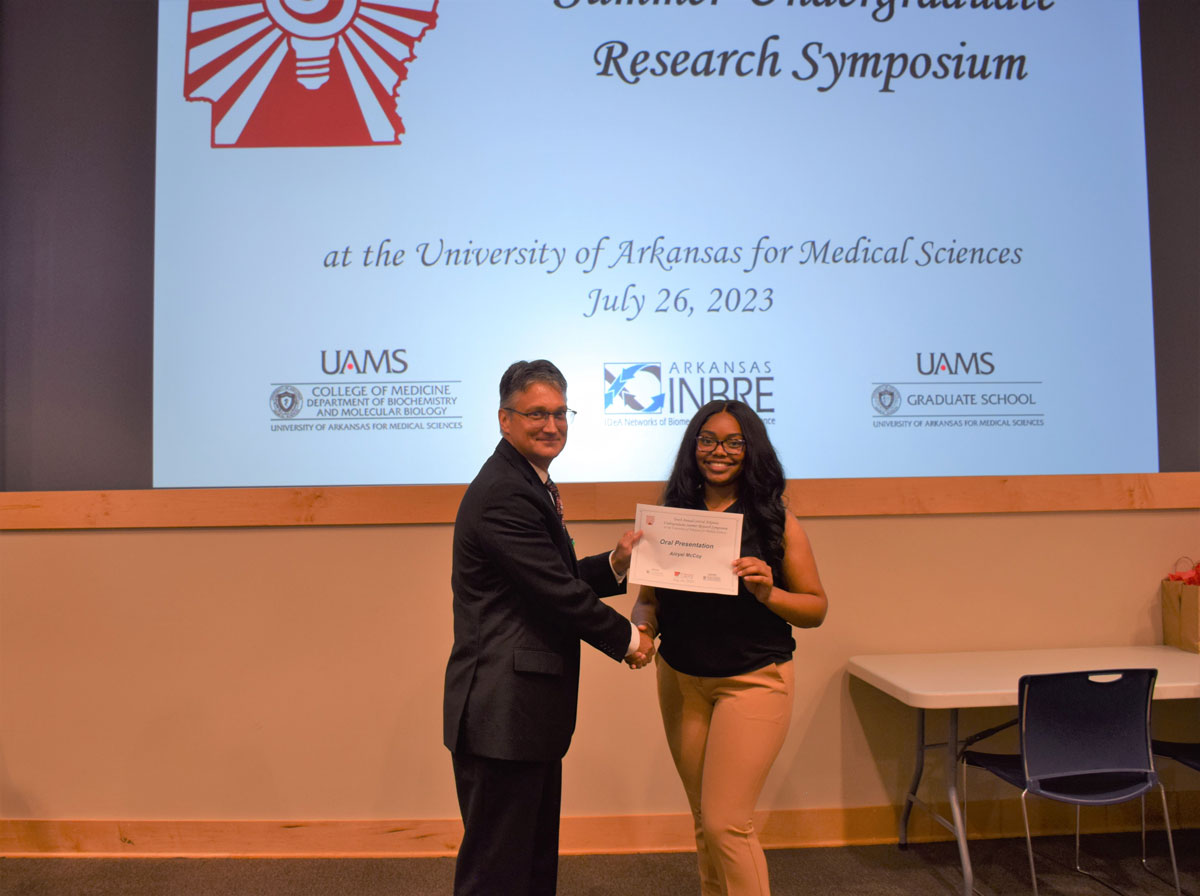McCoy Unlocks World of Possibilities at UAMS INBRE Summer Research Program

One University of Arkansas at Little Rock student and budding scientist dove headfirst into their IDeA Network of Biomedical Research Excellence (INBRE)-funded summer research program at the University of Arkansas for Medical Sciences (UAMS).
Aiiryel McCoy, a senior chemistry major from Little Rock, gained invaluable research experience that promises to shape the trajectory of her academic and professional career while participating in the Professional Research Opportunity (PRO) Summer program.
“The program is geared toward students interested in doing biomedical research,” McCoy said. “You get a step in the door as a lab technician at UAMS, and you work with a fantastic mentor over the summer.”
The PRO Summer Program is a collaboration with the Arkansas INBRE and the Department of Physiology and Cell Biology at UAMS. The 10-week fellowship includes a $6,000 stipend, research supply budget, and a $400 award to travel to a national conference or regional scientific meeting for the student to present their INBRE summer research.
McCoy’s summer research at UAMS also provided the core of a presentation she gave during the 10th Annual Arkansas Undergraduate Summer Research Symposium at UAMS, which students from 41 colleges and universities across the nation attended.
The symposium celebrated achievements by undergraduates pursuing research in a wide range of biomedical-related topics. The UAMS Department of Biochemistry and Molecular Biology organized and sponsored the event with support from the UAMS Graduate School and the INBRE program.
“We want to help prepare a new generation of researchers to solve the problems of tomorrow, especially in light of the pandemic in which science played a critical role in putting us on a path to recovery. Last year, there was high interest and participation that reached pre-pandemic levels,” said Dr. Grover Paul Miller, a professor in the College of Medicine Department of Biochemistry and Molecular Biology and the organizer of the symposium.
McCoy was one of just 12 students selected out of 45 submissions to give an oral presentation on her research, titled “The impact of toll-like receptor 8 (TLR8) on vesicular trafficking and foam cell formation.”
“My summer program at UAMS was amazing,” McCoy said. “My mentor, Dr. Ryan Allen, was exceptional in conveying information and allowing me to have some independence in the lab. I also went out on a limb and applied for the Undergraduate Summer Research Symposium. I did not think I would get chosen so that took me by surprise. I was the first person to present, and I did great. It was very competitive, and I was very thankful for the opportunity to speak in front of more than 200 people about my research.”
McCoy also had the opportunity to serve as a role model for elementary school students who visited UAMS through a collaborative effort of Arkansas INBRE and the Division of Diversity, Equity, and Inclusion. The 25 students from Reed Elementary in the Dumas School District visited UAMS June 19 as part of a science, technology, engineering, art, and math (STEAM) weeklong camp.
The activities lined up for them while at UAMS included a heart valve station, where students had to create a valve that allowed blood (represented by marbles in a box) to flow one way; a station where they made a simulated lung using plastic cups, straws, and rubber; another station where they used stethoscopes to listen to a heart/lung manikin; and a cardiogram simulation that measured heartbeats.
McCoy was part of a lunch panel discussion that included college students and medical students who shared their experiences and answered questions from the visiting elementary students.
“It was a nice experience because the students were very excited to be around older students, and they asked unique questions about why we are interested in medicine and our experiences in middle school, high school, and college,” she said.
